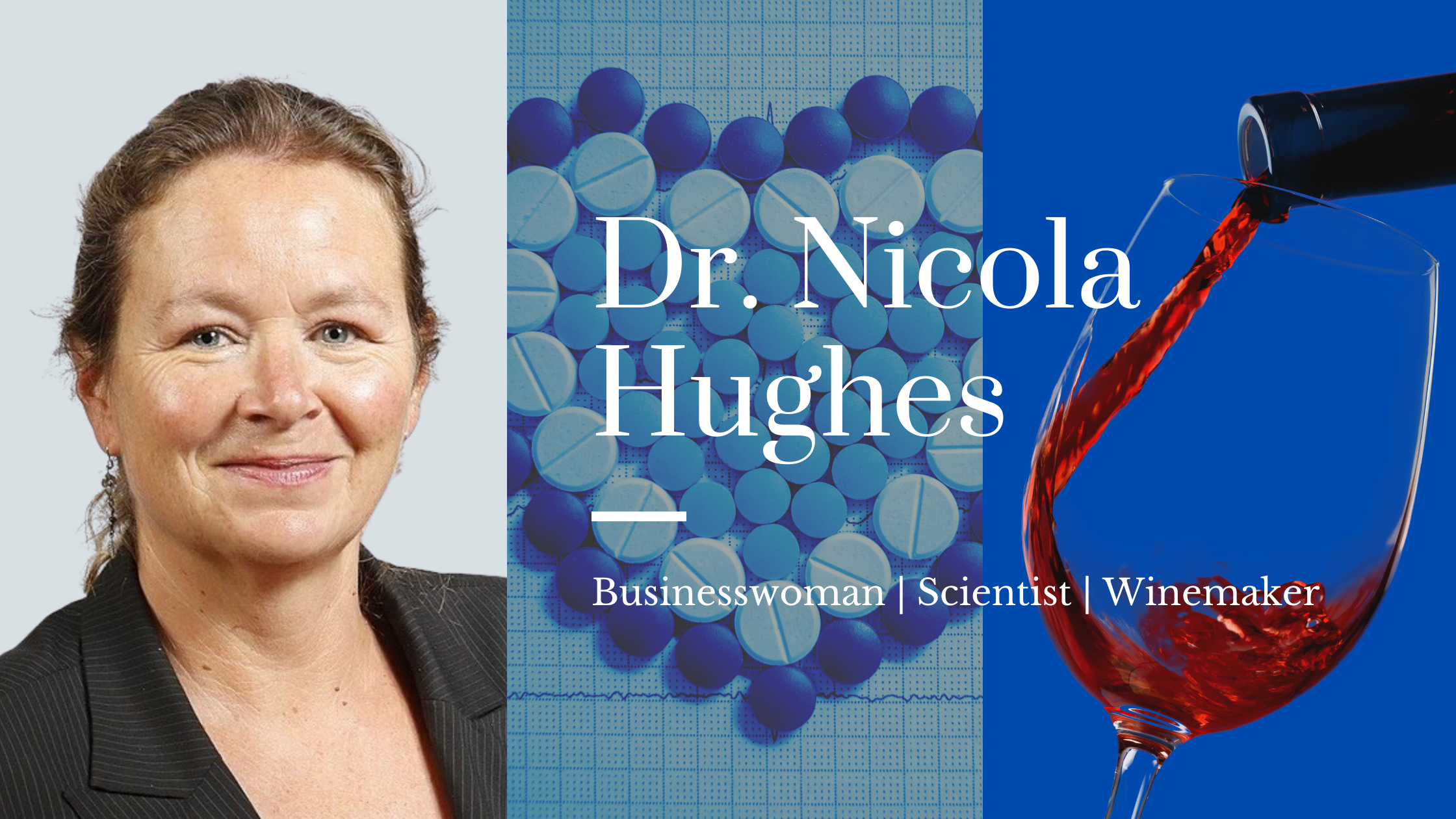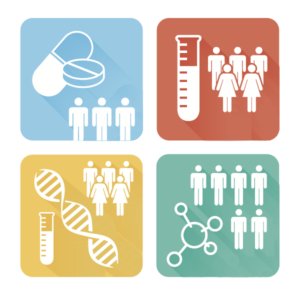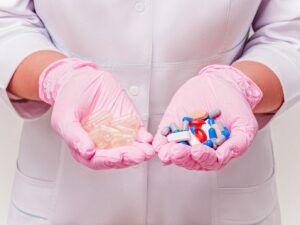Spotlight On Dr. Nicola Hughes, The Winemaking Scientist Leading BioPharma’s Bioanalytical Lab

There has long been a debate about whether winemaking is more of an art or a science. Dr. Nicola (Nicki) Hughes, the Vice President of Bioanalytical Laboratory Operations at BioPharma Services, would probably argue in favor of the latter, and her wine just might support that argument. On top of providing scientific, technical, and operational expertise to the BioPharma business, Dr. Hughes is co-founder of Dragon’s Reach Estate Vineyard.
Years ago, Dr. Hughes and her husband Mark decided that her background in biochemistry, his MBA and geology background, combined with their joint love of wine, would be the perfect blend of skills, experience and passion for opening a winery. While the idea began as something of a dream in 2008, by 2014 the couple had found and fallen in love with a 50-acre property in Ontario, Canada, which they decided to transform into their very own vineyard.
Dr. Hughes loves the process of winemaking and takes great pride in creating and developing Dragon’s Reach. She spends plenty of time in the field, tending to the vines, as well as learning the particular science of oenology and growing her entrepreneurial venture. The name Dragon’s Reach comes from Dr. Hughes’ Welsh heritage – the national flag of Wales features a dragon – and the location of the vineyard on a piece of land called Adolphus Reach in the Prince Edward County wine region.
Over the last few years, Dr. Hughes and her husband have planted a total of 8,000 vines at the vineyard, and taken a hands-on approach, tending to every aspect of the operation themselves, with occasional help from friends and family. That sense of pride and active involvement, as well as an organizational mindset and operational talent, also describes the way Dr. Hughes leads BioPharma’s laboratory.
At BioPharma Services, a boutique contract research organization with a bioanalytical laboratory that specializes in LC-MS/MS-based assays to support non-clinical and clinical trials, Dr. Hughes oversees the R&D, validation, and production teams. A small but nimble company which combines an organizational culture of diligence with an entrepreneurial spirit, BioPharma has built a reputation of excellence, and Dr. Hughes is a critical part of it.
She understands the importance of drug programs and clinical research for clients, setting higher than industry standards to ensure that the lab runs smoothly. And it certainly does; BioPharma studies have a passing batch rate in excess of 98%. Dr. Hughes attributes this incredible success rate to her team’s own expectations for themselves, their enthusiasm for the work and commitment to the highest level of quality.
Like others at the company, Dr. Hughes says the reason BioPharma is distinctive, and delivers so exceptionally for its clients, is the culture of the company, and the people who created it. Her leadership and concerted effort in cultivating such a community is evident from the way she speaks about her coworkers and how she approaches employee development.
Dr. Hughes believes in investing in her employees and giving them tools for growth, and this approach seems to be effective. Many of her team members have moved up from junior, bench-level chemist roles to higher-level study director or principal research scientist positions, thanks to her close work with them developing their skills and providing opportunities for growth.
She believes good people should have space to grow into leadership roles, and her mentorship allows BioPharma employees to do just that. Of course, employee retention and development also benefit the company, as BioPharma has created a stable, collaborative work environment, which enables the team to consistently delve deeper and thrive.
Dr. Hughes’ experience in the pharmaceutical industry spans more than two decades, including 16 years in management, and her enthusiasm for the field is palpable. She’s worked in bioanalytics since 1997 but has had a nearly lifelong interest in the subject matter. When one of her close friends was diagnosed with terminal cancer at the age of 14, Dr. Hughes felt compelled to pursue an education in medicine and better understand the “why” of the world.
She studied biochemistry in the UK and focused her PhD research on chemical carcinogenesis, examining the relationship between exposure to polyaromatic hydrocarbon carcinogens and DNA adduct formation in animal models. This led her into a career in bioanalysis and, eventually, to BioPharma, which had been looking to bolster its lab offering.
Dr. Hughes joined the company in 2016, after facilitating an acquisition that merged her former team at Bioanalytical Laboratory Services (BLS) with BioPharma’s existing bioanalytical operations.
With more than 20 years of research and development experience and proven leadership skills, Dr. Hughes’ mandate starts with R&D, advancing robust and reliable methods to drive efficiency, expedite analysis, and deliver accurate and time-critical results. Nicknamed “Detective Hughes” by her teammates, she has a keen eye for detail and is an expert in examining laboratory data, providing the team with advice and insight on data integrity.
Another area of development Dr. Hughes is spearheading is BioPharma’s implementation and use of Thermo Scientific™ Watson LIMS™, an industry-standard tool for CROs to manage bioanalytical data.
When she’s not in the BioPharma lab or working the vines at Dragon’s Reach, Dr. Hughes gives back to the pharmaceutical industry through mentorship, often speaking at university career nights and helping her own staff grow into leadership roles. No doubt, her hardworking team is also eager to try her first batch of wine, which is maturing and should be ready in about a year.
Of course, Dr. Hughes is constantly checking the brix (sugar content), titratable acid and pH levels, making viticultural adjustments and, she says, sampling the harvest – all in the name of science! She plans to build a tasting room at Dragon’s Reach with a processing laboratory and cellar. Dr. Hughes is always learning, trying to figure things out for herself and looking for growth opportunities, which means she’s never bored.
“I don’t necessarily follow a textbook approach,” she says. “I like to try it myself. My head is full of the basic information and then off I go, continually improving the process.” She’s talking about winemaking at Dragon’s Reach, but that curiosity, care, persistence and desire to impact the world around her is reflected in everything she does at BioPharma, as well.
Scientific formulas aside, perhaps the secret ingredient to Dr. Hughes’ success – whether in the lab, the vineyard, or anywhere else – is not only her interest and expertise in research and development, but also in personal growth and development.
To learn more about BioPharma Services, and the people, culture and community that define it, visit our website.
Popular Posts
-
What are early phase clinical trials?
Clinical Trials are divided into 4 phases. Phase 1 and 2 trials constitute early phase trials, Phase 3 and 4 research studies are late-phase trials.
The primary objective of Phase 1 studies is to determine the correct drug dosage by evaluating drug safety and determining if there are any side effects. Phase 1 trials are conducted in healthy volunteers.
Phase 2 studies also study the safety of a drug but focus on evaluating its effectiveness. These studies can be conducted in healthy volunteers or in individuals who have a certain disease or condition.
-
What is a clinical trial?
A Clinical trial is a process which is performed to determine whether an investigational drug, device or therapy is safe and effective. In early phase research (i.e. Phases 1 and 2), the safety and effectiveness of the drug will be evaluated in healthy volunteers.
-
What is an investigational drug?
An investigational drug can also be called an experimental drug and is being studied to see if your disease or medical condition improves while taking it. Scientists are trying to prove in clinical trials:
- If the drug is safe and effective.
- How the drug might be used in that disease.
- How much of the drug is needed.
- Information about the potential benefits and risks of taking the drug.
-
Why do you need to take blood draws and how many blood draws will be required?
In order to evaluate the drug profile, we need to understand its pharmacokinetics. This is essentially how the body reacts to a drug after its administration through the mechanisms of absorption, distribution, as well as the metabolic changes. Therefore, blood draws are collected at various time points to better understand this mechanism. Each study requires a specific number of blood draws and total blood volume. These values will be provided to you and clearly stipulated in the informed consent form (ICF). The amount of blood that will be taken is outlined in the ICF.
-
Should I expect to experience any side-effects while doing studies?
As every study is testing an investigational product, there may be side effects. You will be provided with a list of side effects that have been reported in previous trials (if any), so you can make an informed decision whether or not to participate in the trial. During the trial you will be required to immediately inform clinic study staff of any adverse effects that you are experiencing. These side effects usually resolve upon discontinuation of the study drug.
-
Will I be compensated for doing a clinical study?
Volunteers are compensated and the amount varies depending on the length of the clinical trial, length of stay and number of follow-up visits. The compensation is not specifically related to the risks or type of drug involved in the trials or studies. Every study is different and therefore, the compensation will vary. Study volunteers may receive between $1000 to $4000 for a trial (based on the factors listed above).
-
Are food and accommodation provided over the course of the trial?
Food – Clinical trials are conducted in a controlled setting which means that all food is provided and trial volunteers receive standardised meals. Individual meal plans or meal preferences cannot be provided. If you have any food allergies or hypersensitivity to food product(s) that are clinically significant or life-threatening you may not be able to participate in a trial. Please contact us to discuss any food issues.
Accommodation – During your in-clinic stay you will share sleeping areas with other volunteers who are of the same gender. Similar to a hospital setting, supervision will be provided to ensure that your health and safety are being monitored.
-
What is the length of a study and do I have to complete all the visits?
Details of the duration of a study can be found on the Volunteer Hub.
-
What is informed consent and how is it carried out?
Before you decide whether or not to take part in a clinical research study, you will be required to read and understand the information provided in an Informed Consent Form (ICF). The ICF describes the clinical research study and the nature of the investigational product to be used, including:
- Your rights and responsibilities as a study participant.
- What you will be asked to do during study participation.
- The potential risks that you should be aware of.
During this process, you will have the opportunity to discuss and ask questions related to the conduct of the clinical research study with the study doctor/ study staff. You are under no obligation to participate and your decision to take part in a clinical trial is voluntary.
-
Can I bring my own device?
Yes, we encourage you to bring items that will help to pass the time while you are in the clinic. You can use the time to study or work or catch up on the movies you’ve been meaning to watch.
-
What do I need to pack?
Wondering what to pack before your site visit? Visit our Packing List page to learn more.
-
When do I receive compensation for taking part in a study?
You will receive compensation as outlined during the Informed Consent process. Typically, you will receive compensation once all study visits have been completed. If, for any reason, you do not complete all study visits, your compensation will be on a pro-rated basis (i.e. for the time that you have participated in the trial)
-
Where will I sleep during the clinical study?
We provide a clean, safe socially distance sleeping environment, in a dormitory of hotel room style. Watch video
-
Can I bring my own food?
All aspects of clinical trials are closely monitored including the food and drink consumed by participants. While you are in the clinic, you will be provided with all meals as per the study guidelines. You will need to eat all the food provided to ensure the guidelines are met. Watch video
-
Privacy
We respect and value the privacy of our volunteers. View our Privacy and Cookie Policy here.



